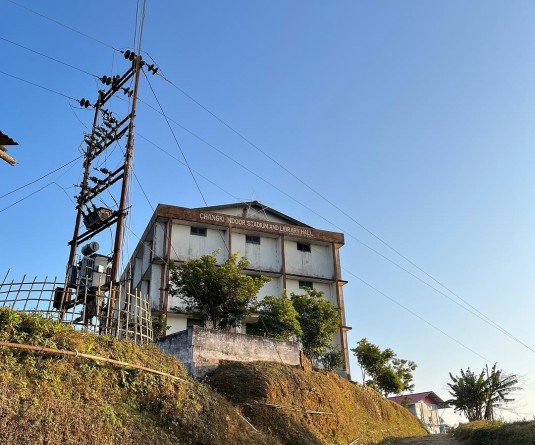Dr. Lanusangla Tzüdir, Chief Editor at Heritage Publishing House (HPH), introduces the panel talk and discussion hosted by HPH at DABA’s Elim Hall on Saturday, December 17, as panelists (L-R) Dr. Walunir, Khekiye K Sema, Mmhonlumo Kikon and Toshi Wongtong look on. (Morung Photo)
Need for inclusive mechanism mooted at Heritage panel discussion
Morung Express News
Dimapur | December 17
The basis for a revolution is transformation. If Naga society wants its movement(s) for justice to get support from the grassroots, then a ‘pedagogy of transformation’ must be adopted wherein an ‘inclusive mechanism’ and community participation become the working principles of ecclesial (church based) and education institutions—this will be necessary to break the present unjust systems at work. The pedagogy, of emancipation, must begin with the intellectual.
Dr. Wati Aier, Principal of the Oriental Theological Seminary, espoused this thought in his concluding remarks at a panel talk and discussion organized by the Heritage Publishing House on ‘Systemic Dynamics in Naga Society and Politics,’ aimed to create people-to-people dialogue on Naga socio-political systems.
Naga people must pursue a system which fills the gap of “unmade demands” at the grassroots—thus the prelude to action from the “have-nots” is intellectual analysis that must fuel transformation, Dr. Wati maintained.
The panel, moderated by Panger Kechu, heard talks from Toshi Wongtong, Khekiye K Sema, Mmhonlumo Kikon and Dr. Walunir, and was held at the DABA’s Elim Hall here today. The program was introduced by Dr. Lanusangla Tzüdir, Chief Editor at Heritage Publishing House.
Developmental Democracy in the Grassroots of Naga Society
Speaking on the topic, social activist and senior research fellow at Indian Council of Social Science Research (ICSSR), Toshi Wongtong noted that too much emphasis on ‘packages’ rather than ‘capacity building’ and infrastructure development has led to lopsided development and gross mismanagement in Nagaland State.
“Human Resource development is negligent in Nagaland. Due to lopsided planning, we have education here that is devoid of enlightenment,” noted Wongtong in his talk. An emphasis on good primary education would have injected a sense of responsibility in people towards governance. As education, democracy and development are interlinked, the social activist postulated that the lack of one has led to the lack of the rest in the State.
In voting patterns or policy making in Nagaland State, for instance, tribal affiliation and favouritism influence decisions rather than requirement, resulting in an overall imbalance. Justice and equality, Wontong observed, is central to good democracy, and for these to happen people must elect responsible leaders who are transparent and accountable to the people leading to inclusive and participatory governance.
Regulatory Mechanisms in Democratic Systems: Moving beyond RTI
The basics of a State set up in India are the legislature, executive and judiciary—but when the legislature becomes irresponsible, it bears down on the executive as well. In this scenario, the judiciary is left with the task of husking out the just from unjust. Senior ACAUT Nagaland activist and retired IAS officer Khekiye K Sema was explaining this as one of the panelists here today.
He maintained that the first crop of legislators and executives (bureaucrats) of Nagaland State were honest and abiding Christians which helped them remain transparent and accountable to the people. The best infrastructure in the State was built during their time.
Things went downhill thereon with corruption seeping into every branch of governance.
The lack of a value system and shared responsibility towards the community has led to a “total sell out of the system” of governance in Nagaland State wherein the bureaucracy has given up its task to guide the people, or make the system more accountable. Thus, all responsibility lies with the judiciary to decide legal from illegal, said Sema. However, the judiciary has also come under immense pressure today.
The senior activist noted that unless we go beyond the RTI and judiciary, justice will not be done, which is why ACAUT Nagaland is trying to raise the conscience of the people about their rights and the need to stand up for them.
Good governance and Inclusive development in Nagaland
Member of Nagaland State Legislative Assembly, Mmhonlumo Kikon, brought focus on the subject by stating that democratic institutions in Nagaland are in place but democratic processes are found wanting.
Equitable justice, he maintained, is central to a healthy democracy. While this has not been the trajectory of development in the State, the “problem of insularity” has made corruption “endemic” while lapses in decision making have become “systemic”.
This means that policy decisions are made without referring to informed knowledge, but influenced by such factors as tribe or personal benefit leading to governance problems that are peculiar to Nagaland State, which have in turn become embedded in the system, thus depriving the Naga people of equitable distribution of available resources.
To address the issues of injustice, thus, it is important for the civil society to understand how decisions are made and actively engage the legislature, executive and the judiciary, explained Kikon. Problems cannot be addressed only at one level, and a level of engagement must be maintained with the constituency or grassroots who can pressurize their leaders into action.
Relationship between Representative Bodies and People
Dr. Walunir, who teaches at Amity University in Noida, questioned the current relationship between representative bodies and the people today when systemic failure is a key feature amidst apparent normalcy in Nagaland State.
Noting that there is clear “disintegration and fragmentation” of Apex Naga civil society organizations, he wondered if the emergence of new “Naga sectarian blocs” is in the interest of the people?
Further, he explained that internal mechanisms within the State have led to the establishment of corruption within the system leading to a systemic failure of democracy. This is normalized by “narratives of legitimization of discursive and abusive acts and universalization of corruption.”
Dr. Walunir also questioned the NSCN (IM) Collective Leadership by asking why, in a “democratic movement,” do the people not know what is being discussed and decided behind closed doors?
In all these unfolding scenarios, people of Nagaland State have now moved from the culture of fear and silence to the culture of corruption that has been internalized and normalized, he stated, thereby concluding that the time is not yet ripe for a revolution for the Naga people—it is, however, time to evolve people-to-people dialogues.
Going beyond the State
In the public discussion that followed, Dr. Aküm Longchari, Editor of The Morung Express, pointed out that we are deploying the language of ‘reformation’ as long as we stick to the Nagaland State as point of reference. As Nagaland State was created as a ‘security apparatus’, a response to a so-perceived law and order situation, we cannot discuss issues of justice, rights or equality within its parameters. Revolution will take place when these issues are discussed beyond the Nagaland State.





